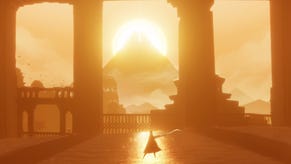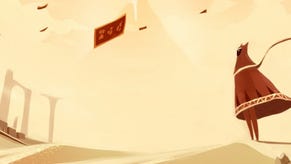A Hero's Journey
Jenova Chen's mission to revolutionise multiplayer.
He's really not wrong about a "sense of awe". Chen's previous game, Flower, was rightly rewarded with a BAFTA for its unique artistic merits; Journey must surely be a strong contender for next year's prize.
The technical achievement behind the gleaming, rippling sands is remarkable enough, but the way this mechanical, mathematical feat has been deployed on the artist's canvas of magnificent vistas, epic scale and detail is wonderful to behold.
From the powerful minimalist opening as the mountain emerges ominously from behind the top of a dune, to the breathtaking pastel-skies of the third section's initial panorama, I doubt I'll clap eyes on a prettier game this year. The simple elegance of the interface in the studio's previous titles has also been preserved, in accordance with Chen's ambition to make experiences that appeal to as wide an audience as possible.
"Our design philosophy over the past few years from fl0w to Flower to Journey has been refining," he says. "I think it more and more feels like a Japanese garden: when there's nothing else you can trim then that's the best design!"
Unlike a Japanese garden, if you trim too much in a video game, you can just as easily add it back in again. I meet Chen before the beta launches, at which point the in-game camera is controlled exclusively by SIXAXIS motion-control.
"You don't use the stick to look around," he insists, arguing that it would exclude those not familiar with the traditional "grammar" of video games. The beta launches with this feature intact, but an update swiftly introduces right-stick camera control – a clear improvement, and a good example of the importance of user feedback.
Another chapter in the book of gaming grammar Chen has torn up is the way in which multiplayer games are accessed. "We want to create something that is very intuitive, but in an online game, you pick a multiplayer game [from a menu] and then you create a lobby, wait for people to join, check latency, confirm, start the game… All this work that is not actually the game."
His team is guided by the principle of what is the most "human" design decision, he explains. So there is no lobby. Other players simply appear in the game seamlessly.
Reducing complexity to attract more users has been a major part of the global gaming business since Wii Sports grabbed its first granny. For Chen, it's a technological issue that has not just stunted growth, but also the medium's emotional development.
"It has a lot to do with what the technology is good at," he argues. "When games first evolved it was easier to simulate physics-based things, so a lot of games are very physical and action-oriented. But if you look at any entertainment medium, if you want to have everybody enjoy this medium you need to have a wide variety of genres.
"[That's why] games have been very much focused on actions, empowerment, competition, conflict, anxiety and adrenaline feelings. There are very few games about the feeling of romance, relaxation, zen, peace, harmony – any deep feeling or slow feeling, it's not there."
With Journey's release date pencilled in for later this year, smack bang in the middle of the angry pyrotechnics of Call of Duty, Battlefield and all the other big budget, big balls blockbusters, any one of those feelings should make this a trip worth taking.








